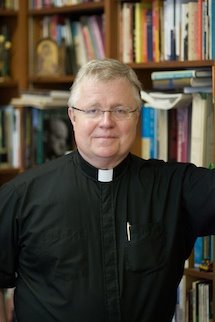Advent is a season of hope. It is a time when Christians with a candle mark off the weeks before Christmas, using that time for preparation and for waiting. It is symbolized by light in the middle of darkness. Christ is that light, which makes Advent a season of anticipation. Yet to some, it is looked at as a bit foolish and even pollyanna like. Isn’t it naive to talk of hope amidst all of the rather dark news that we hear about on a daily basis. The congress doesn’t get along, the deficit is enormous, spending is out of control, unemployment is at record heights and China holds our country’s debt. We could talk about Ireland and Greece needing a bailout, we could look at the absolute mess that is happening in Haiti with earthquakes, floods and a cholera epidemic in the wings. On top of all this, we have over 100,000 troops on the ground in Afghanistan and Iraq who are in harms way every day. Actually it’s an interesting picture of darkness.
One of the interesting American authors of recent years is Cormac McCarthy. His novels about the loss of the old west as it changes into what we now know is a chronicle of a lost frontier and way of life. He has written numerous novels but one that stands out is “No country for old men”. Perhaps you saw the movie which was very well done. It left me at the edge of my seat, however it is a dark tale. In fact you could call it a tragedy. One of the leading figures in history is Tom Bell, an aging Texas county sheriff investigating a deal that has gone wrong. However, on the very last page of the novel Bell, now retired from his job speaks of a memory. What he remembers is an old house he once saw with a water trough, hewn with solid rock which was 100 years old by his estimate. He thinks about the man who chiseled it from stone. It would have taken hours and hours to do, yet he feels that it is something solid that would be around for 1000 years, long after even the house. He wonders why someone would do that. He says “I have to say that the only thing that I can think was that there was some sort of promise in his heart...I would only like to be able to make that kind of promise.”
Advent is about a story with a promise. It is about a world of despair with a promise of hope. It is about a light that is lit in the midst of darkness. It is about a community of people who gather around the hope of Christmas, the hope of a child whose message is Emanuel/God with us.
This brings me to another piece of this movie which we could safely call an American tragedy. Bell remembers two dreams he has about his deceased father who was a sheriff like him with an old fashioned, unbending integrity that was a part of his being. His dream goes like this, he remembers that it goes back to older times when they were on horseback in the night going through the mountains. It was even cold and there was snow on the ground. There was this rider who was his father who rode past him in the darkness and the cold. He just kept on going, he never said anything. He just rode on past with a blanket round him, his head down as he carried fire in a horn the way people used to do in another time distant in our memories. You could see the fire glowing inside like the color of the moon. All he knew is that he was going ahead and he was fixing to make a fire somewhere in the dark and in the cold. Bell thought that however far he got he knew that he would be there and then he woke up.
Christians live with Advent hope. They live with the assurance that we are not alone in this Universe. We live with the knowledge that no matter where we end up there will be this light that will greet us. A light out ahead of us, a light that shines in the darkness that will bring warmth and comfort.
Recently I have been hit with the prospect of doing several funerals in a row. I remarked to someone that it doesn’t feel like Advent, it feels more like Lent. All of this death and sadness can gang up on you in this world. Yet at the same time, I had this feeling that these experiences were just mirroring what the world is about. There’s no running from death, it’s the great equalizer. Whether you’re rich or poor, famous or anonymous, honest or a scoundrel, the old man with the scythe is coming to get you.
Yet amidst all of the tears and darkness, there is this light the bible says that the darkness cannot overcome. It is the light of Christ, the light of the Christmas message, the light of a mother and child in a manger. *
May you take advantage of the Advent season and make it an opportunity to connect with the light of the world - Our Lord Jesus.
--MEH
*I’m indebted to the writing of Tom Long and William Willimon for this article.


.jpg)